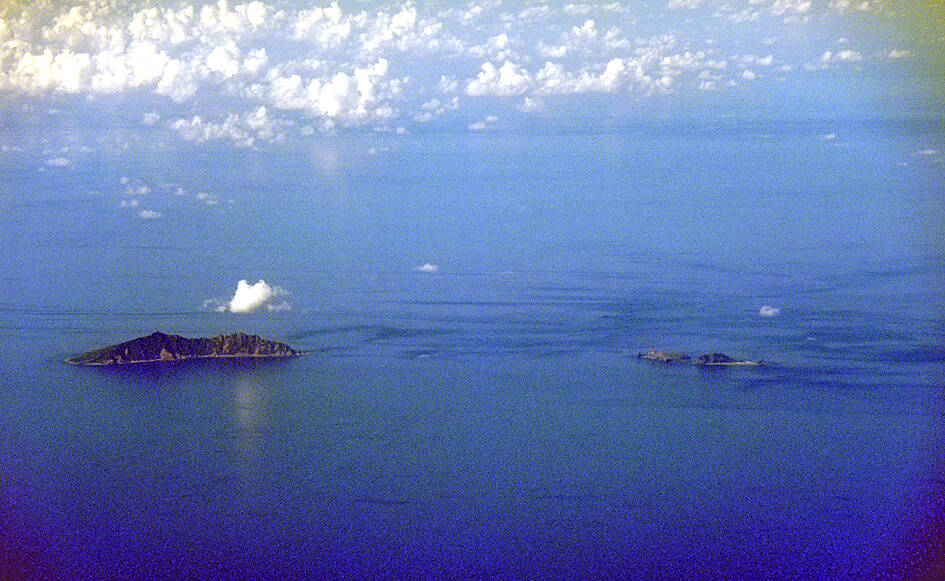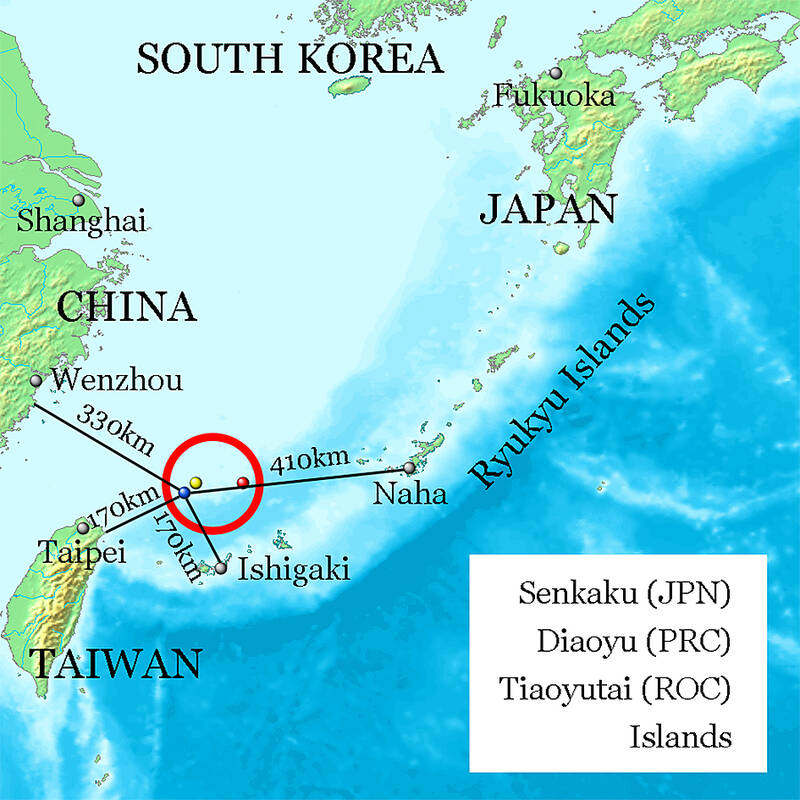Tensions are rising all across Northeast Asia, not just in the Taiwan Strait.
Beijing has been escalating claims over the Senkaku Islands (which Taiwan calls Diaoyutai, 釣魚台), Okinawa and the Russian Far East. North and South Korean relations have been deteriorating rapidly, and they may have just barely escaped an alleged “limited war” plot.
In Taiwan, Japan and South Korea the ruling parties lack majorities in their legislative bodies and South Korea is in turmoil following a failed attempt to impose martial law. There is a murky power struggle going on in Beijing.

Photo courtesy of Wikimedia Commons
A ‘LIMITED WAR’ NEAR MISS
South Korean President Yoon Suk-yeol’s failed plot to impose martial law rightfully gained significant international news coverage. So did North Korea’s unusual campaign of sending balloons carrying garbage into the south.
Receiving less coverage was North Korea abandoning the goal of peaceful unification, and in October enshrining the definition of South Korea as “a hostile state” in the constitution and blowing up the former road and rail links into the South.

Photo courtesy of Wikimedia Commons
Potentially one of the reasons North Korean soldiers have been sent to aid in the defense of Russia in the Kursk Oblast is to get first-hand experience in modern combat, though initial reports suggest the Ukrainians are finding them easy targets.
Several South Korean lawmakers have said that Yoon’s coup plot may have included plans to trigger a “limited war” with North Korea to justify declaring martial law.
Both Yoon and North Korean dictator Kim Jung-un’s recent actions do not inspire confidence in the stability of either.
Yoon has been impeached and is on suspension. The courts have six months to determine if he should be removed from office and a new election held.
Potentially, this could be bad news for regional stability in the Taiwan Strait. US President Joe Biden had finally successfully held a US-Japan-South Korea Summit at Camp David and Yoon had expressed support for Taiwan.
The leader of the opposition Democratic Party Lee Jae-myung said on the campaign trail in March “Why keep pestering China? . . . Whatever happens in the Taiwan Strait, whatever happens with China and Taiwan’s domestic issues, what does it matter to us?”
His party is routinely described as being less pro-American, more hostile towards Japan and friendlier to Beijing. However, with North Korea literally burning their bridges on unification and increasingly turning to Russia for support, the perceived value of China’s value in influencing North Korea may diminish.
REMEMBERING THE RYUKYU KINGDOM
The People’s Liberation Army (PLA) has been ramping up the pressure on Japan over the Senkaku Islands and Okinawa Prefecture.
The PLA is increasingly a common presence in the waters surrounding the Senkakus, but in August for the first time encroached on Japanese territorial air space with a Y-9 surveillance plane near the Danjo Islands in the Nagasaki Prefecture, forcing the Japanese to scramble fighter jets.
The CCP was unusually quiet about the recently concluded PLA military exercises, which were geographically extended north across from southern Japan. The drills appeared to be extending forces outward to test anti-access/area denial (A2/AD) objectives, presumably with the US and Japanese militaries in mind.
The Senkaku Islands are located 186 kilometers from Keelung and 170 from Japan’s Ishigaki, potentially making them useful for increasing pressure on both Taiwan and the southern end of the Ryukyu Islands in the Okinawa Prefecture. There may also be oil reserves in the area.
Okinawa previously was the Ryukyu Kingdom, which had for hundreds of years been a Chinese tributary state, but was incorporated into Japan in 1879. Japan occupied the Senkakus in 1895 during the Sino-Japanese war that ended with Taiwan ceded to Japan.
The Senkakus are administered from Okinawa in practice, but Beijing and Taipei both claim they are in Taiwan’s Yilan County.
Chinese nationalists have pushed for China to take the Ryukyu Islands, and last year Chinese Communist Party (CPP) leader Xi Jinping (習近平) referred to them as “Ryukyu” and not “Okinawa.” On Sept. 1, plans were announced to launch a Ryukyu research center in China.
WHEN THE CCP HAS GONE TO WAR
Though the CCP has been increasing tensions around both, they are doing so similarly on most fronts, including in the South China Sea and the Himalayas.
Under normal circumstances, they would likely continue on this path, using “salami-slicing” tactics to nibble away at Japan’s territorial integrity as they have done in the South China Sea and Bhutan, though they are in peace talks with India — possibly to allow them to relocate resources elsewhere and boost economic ties to ease China’s struggling economy.
The other common practice employed by the CCP is to use money and investment, often taking advantage of local corruption, and bring in many of their people to gain considerable leverage over the target country. The Belt and Road Initiative (BRI) at times serves this purpose.
China has gained considerable influence in Cambodia and Laos through these methods, though they are not quite tributary states in the traditional sense.
By using these tactics, they avoid provoking costly wars.
However, when there is turmoil and a struggle for power inside the CCP, they do send in the troops. In 1962 when Mao Zedong (毛澤東) was being sidelined into a figurehead following his disastrous Great Leap Forward that left tens of millions dead, the PLA marched into India.
Similarly, in the turmoil following Mao’s death and when Deng Xiaoping (鄧小平) was still trying to consolidate power around himself they marched into Vietnam.
COULD BE HAPPENING HOW
There are indications that an internal CCP power struggle is happening now, especially inside the PLA.
The PLA Daily earlier this month ran two very unusual editorials, one on Dec. 9 mentioning “take the lead and adhere to collective leadership” and another on Dec. 11 discussing “take the lead in promoting intra-party democracy.”
In CCP speak these are calls to end “one man rule” and hint ending Xi’s burgeoning personality cult.
Some key people considered to be Xi’s cronies have been ousted, including the influential Admiral Miao Hua (苗華), who Xi used to handle personnel picks. At some events and venues in the PLA references to Xi and “Xi Jinping thought” have been dropped.
In remarks made in January, but only publicized this month, Xi said “As the situation and tasks facing the party change, there will inevitably be all kinds of conflicts and problems within the party.”
He added: “We must have the courage to turn the knife inward and eliminate their negative impact.”
About 610,000 party officials were punished last year for “violating party discipline,” of which 49 were officials above the vice-minister or governor level. Xi’s paranoia has been making him enemies.
JAPAN LOWER ON THE LIST
If the PLA does make moves in Northeast Asia, the Senkakus and Okinawa would not be the top priorities — they are not as valuable as Taiwan and the US is treaty-bound to help defend them. However, they would likely be roped in if Taiwan were the target.
After dismissing it for years as unlikely any time soon, some striking news has caused a reassessment of the possibility of moves being made in the Russian Far East.
We will examine why in an upcoming column.
Donovan’s Deep Dives is a regular column by Courtney Donovan Smith (石東文) who writes in-depth analysis on everything about Taiwan’s political scene and geopolitics. Donovan is also the central Taiwan correspondent at ICRT FM100 Radio News, co-publisher of Compass Magazine, co-founder Taiwan Report (report.tw) and former chair of the Taichung American Chamber of Commerce. Follow him on X: @donovan_smith.

Under pressure, President William Lai (賴清德) has enacted his first cabinet reshuffle. Whether it will be enough to staunch the bleeding remains to be seen. Cabinet members in the Executive Yuan almost always end up as sacrificial lambs, especially those appointed early in a president’s term. When presidents are under pressure, the cabinet is reshuffled. This is not unique to any party or president; this is the custom. This is the case in many democracies, especially parliamentary ones. In Taiwan, constitutionally the president presides over the heads of the five branches of government, each of which is confusingly translated as “president”

By 1971, heroin and opium use among US troops fighting in Vietnam had reached epidemic proportions, with 42 percent of American servicemen saying they’d tried opioids at least once and around 20 percent claiming some level of addiction, according to the US Department of Defense. Though heroin use by US troops has been little discussed in the context of Taiwan, these and other drugs — produced in part by rogue Chinese Nationalist Party (KMT) armies then in Thailand and Myanmar — also spread to US military bases on the island, where soldiers were often stoned or high. American military policeman

An attempt to promote friendship between Japan and countries in Africa has transformed into a xenophobic row about migration after inaccurate media reports suggested the scheme would lead to a “flood of immigrants.” The controversy erupted after the Japan International Cooperation Agency, or JICA, said this month it had designated four Japanese cities as “Africa hometowns” for partner countries in Africa: Mozambique, Nigeria, Ghana and Tanzania. The program, announced at the end of an international conference on African development in Yokohama, will involve personnel exchanges and events to foster closer ties between the four regional Japanese cities — Imabari, Kisarazu, Sanjo and

The Venice Film Festival kicked off with the world premiere of Paolo Sorrentino’s La Grazia Wednesday night on the Lido. The opening ceremony of the festival also saw Francis Ford Coppola presenting filmmaker Werner Herzog with a lifetime achievement prize. The 82nd edition of the glamorous international film festival is playing host to many Hollywood stars, including George Clooney, Julia Roberts and Dwayne Johnson, and famed auteurs, from Guillermo del Toro to Kathryn Bigelow, who all have films debuting over the next 10 days. The conflict in Gaza has also already been an everpresent topic both outside the festival’s walls, where